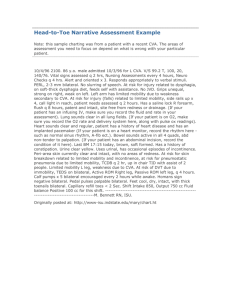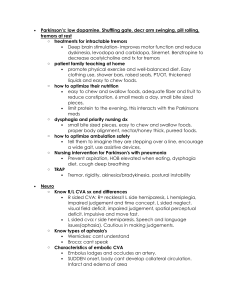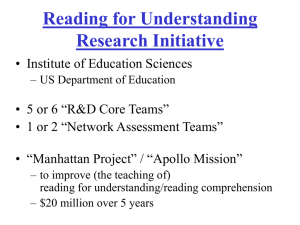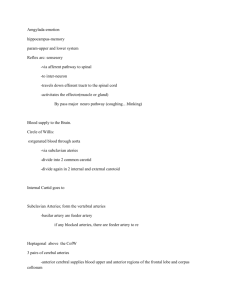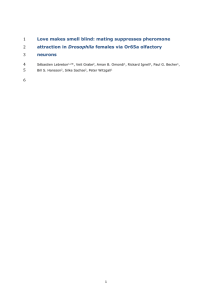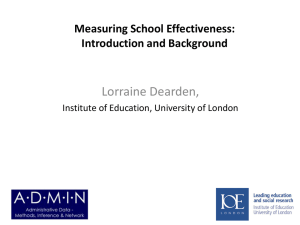The Education Reform Act: 20 years on
advertisement
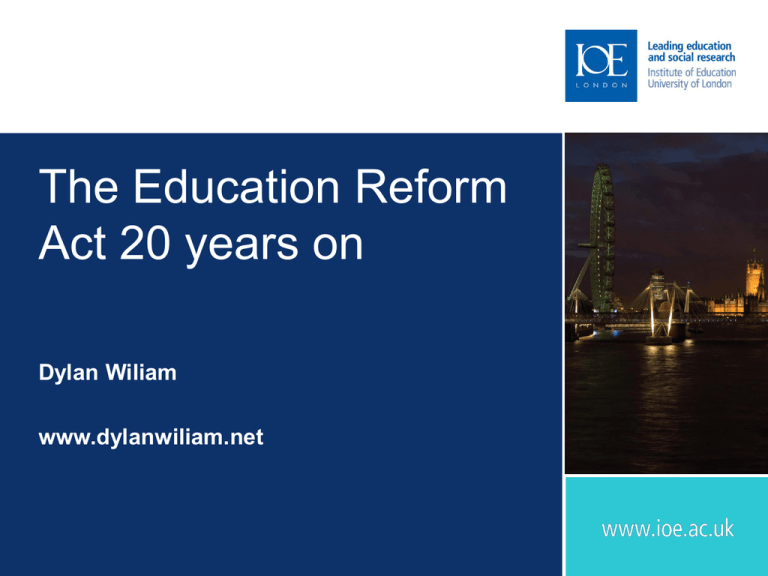
The Education Reform Act 20 years on Dylan Wiliam www.dylanwiliam.net Overview of presentation The key components of the Education Reform Act The two big myths about parental choice The effects of “hyperaccountability” Why this matters The 1988 Education Reform Act An extremely coherent piece of legislation Main assumption: markets are the best way to improve schools To create a market, you need: Choice: parental choice Accountability: formula funding Diversity: grant-maintained schools, local management Standardization: national curriculum Information: national tests at 7, 11, 14 and 16 Apart from that, Mrs. Lincoln… The potentially positive features of ERA… National curriculum (the idea, not the particular curriculum) Local management of schools Formula funding (again, the idea, not the current policy) …have been largely negated by tragic shortcomings The myth of parental choice… …fuelled by misleading information How to judge school quality? “There is always an easy solution to every human problem: neat, plausible, and wrong.” (Mencken, 1917) Raw outcome data Useful when inputs are equal Completely misleading when they are not (e.g., surgical survival rates) Government schools Obs er ved performance di fference Government dependent private Government independent private 0 20 40 60 80 Di fference after accounti ng for soci o-economi c backgr ound of students and schools 100 -150 -100 -50 0 50 100 Luxembourg Japan Italy Switzerland Finland Denmark Czech Republic Sweden Hungary Austria Portugal United States Netherlands Slovak Republic Korea Ireland Spain Canada Mexico New Zealand Germany OECD United Kingdom OECD Raw results vs. value-added Examination success rates combine two effects The quality of the teaching The quality of the intake The second dominates the first Contextualized value-added (CVA) is by far the best measure of the contribution that a school has made to the achievement of its students Differences in CVA are often insignificant… Middle 50%: differences not significantly different from average (Wilson & Piebalga, 2008) …and are usually small 7% of the variability in secondary school GCSE grades are attributable to the school 93% of the variability in secondary school GCSE grades are nothing to do with the school A student who gets eight grade Ds at an average school will get: five Ds and three Cs at one of the best schools (1sd above mean CVA) five Ds and three Es at one of the worst schools (1sd below mean CVA) 1.0 0.8 % 0.6 L 2 + E M 2 0.4 0 0 7 0.2 960 1000 1040 CVA 1080 …but some schools are amazingly good Moreton Community School %5A*-C 30% CVA 1090 A student who gets eight Ds at an average school will get seven Bs and a C here The effects of “hyperaccountability” Effects of test preparation Literacy 100 Proportion ac hieving level 4 90 Children receiving 1 2 3 years of the Literacy Strategy 80 B B B B B 2000 2001 2002 2003 B B 2005 2006 B B 70 B B 60 B 50 B 40 1995 1996 1997 1998 1999 2004 2007 Numeracy P ro p o rtio n a c h ie v e in g le v e l 4 100 Children receiving 90 1 2 2000 2001 3 years of the Numeracy Strategy 80 70 60 50 40 30 20 10 0 1994 1995 1996 1997 1998 1999 2002 2003 2004 2005 2006 2007 2008 Standards at key stage 2 KS2 attainment 1995-2007 100 90 % o f p u p ils a t le v e l 4 80 70 60 English 50 Maths Science 40 30 20 10 0 1994 1996 1998 2000 2002 2004 2006 2008 20 20 06 05 04 3 2 1 0 9 8 /0 /0 /0 7 6 5 46 /0 /0 /0 /0 /9 /9 /0 02 01 00 99 98 03 20 20 20 20 20 19 19 97 6 75 /9 /9 95 96 19 19 19 P e rc e n t a g e a c h ie v in g Standards at key stage 4 70 65 60 55 50 5 A*-C 45 5A*-C +EM 40 35 30 560 550 540 530 PIRLS 520 PISA(S) PISA(M) 510 PISA(R ) TIMSS(M) 500 TIMSS(S) 490 480 470 460 95 96 97 98 99 00 01 02 03 04 05 06 Why does it matter? The changing demand for skills (USA) (Levy & Murnane, 2005) Conclusion Attempts by successive governments to raise student achievement have Produced only marginal improvements in student achievement… …that are primarily in skills that are increasingly irrelevant in work… …while performance on the skills that matter has declined… …thus threatening our future prosperity… …and alienating a generation of students.



